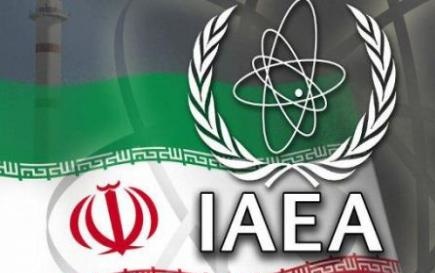In a notable shift in nuclear rhetoric, Iran’s media and former officials shifted from praise to criticism of the International Atomic Energy Agency on Monday.
On Sunday the regime hailed the visit of IAEA head Yukiya Amano to Tehran, quoting his comments on a “short but useful” meeting over arrangements for supervision and inspections of nuclear facilities. It noted his discussions with President Rouhani, Foreign Minister Zarif, and the head of the Atomic Energy Organization, Ali Akbar Salehi.
However, regime outlets are now damning the IAEA for alleged duplicity and hostility towards. Press TV features an interview with a “political commentator”, Mostafa Khoshcheshm, who denounces the IAEA for being directed by “US pressures”.
Iran’s former Ambassador to the Agency, Ali Asghar Soltanieh, told a forum on nuclear policies on Monday that “the IAEA is presently ruled by political debates and intelligence agencies.
He also put out the allegation that that the IAEA Board of Governors is under the influence of Western countries, and said Iran’s efforts to reach agreements with the IAEA “were blocked by certain states”: “We conducted over 100 hours of negotiations in Tehran in response to the issues raised by the IAEA and prepared a 117-paged response, but they raised new topics in the last moment to rock the boat.”
The criticism of the IAEA followed statements by President Rouhani and other officials on Sunday setting out “red lines” for nuclear negotiations with the 5+1 Powers, ruling out the inclusion of ballistic missiles in an agreement. After his meeting with Amano, Salehi specifically called for closure on issues such as Iran’s possession of explosive bridge-wire detonators.
However, the shift in rhetoric may come from a wider context — last week the Supreme Leader denounced talks with the US as “useless” and said the Americans could not be trusted in negotiations.
While holding back from any denunciation of the US and maintaining that negotiations will proceed in the autumn, the Rouhani Government has moved cautiously since Ayatollah Khamenei’s statement. Foreign Minister Zarif cautioned this weekend that a comprehensive agreement might not be reached before the expiry of interim arrangements on November 24, and he said yesterday that all sanctions must be lifted on Tehran for any hope of resolution.
Before Monday’s shift, Iran relations with the IAEA had been marked for months by progress. The two sides agreed guidelines in November and February for inspection of nuclear facilities and uranium mines, and Tehran agreed to provide information to the Agency on the detonators, which Western countries have alleged could be used for development of a nuclear weapon.

